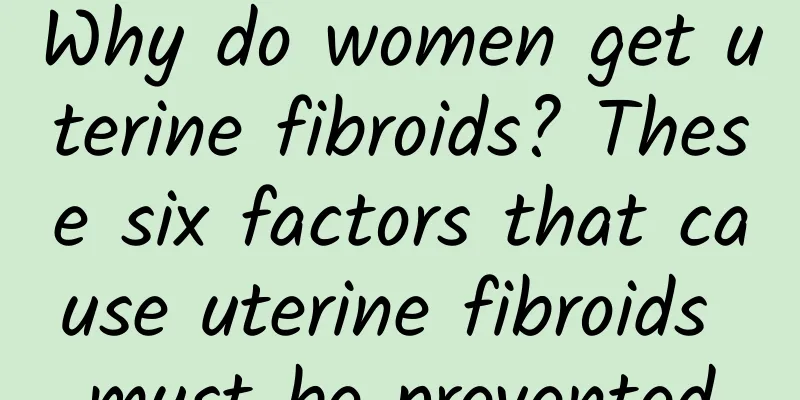Why do women get uterine fibroids? These six factors that cause uterine fibroids must be prevented

|
Speaking of uterine fibroids, the real pain that all women linger on may be attacked by this disease inadvertently. Then the treatment of uterine fibroids is on the agenda. We all know that to treat a major disease, we must first know the cause. Let's take a look at why women suffer from uterine fibroids. Why do women get uterine fibroids? 1. High-hormone contaminated foods: Such as chickens, ducks, fish and vegetables that are fed with large amounts of hormone feed for a long time, which is an important reason for the high incidence of uterine fibroids. 2. Inharmonious sex life: Normal sex life between husband and wife can promote and stimulate the normal function of female neuroendocrine, so that the hormone secretion in the female body is normal and good. However, once a woman's sex life is disordered for a long time, it will lead to disordered secretion of hormone levels in the body, chronic congestion in the pelvic cavity, and uterine fibroids. 3. Mental stress: Modern women often need to face the dual mental stress of work and family, which makes everyone feel depressed. With the arrival of menstruation, women may begin to experience the estrogen control period. During this period, women's own depression can easily increase estrogen secretion and enhance its effect, which can sometimes last for several months or even years, which is also an important cause of uterine fibroids. 4. Taking beauty and health products: Many women intentionally or unconsciously increase the estrogen level in their bodies without the guidance of a doctor. 5. Oral contraceptives: Women at an earlier age have a higher risk of developing uterine fibroids. 6. Environmental impact: Long-term exposure to toxic and harmful environments, such as exposure to pesticides, eating eels and turtles fed with hormone-containing feed, etc. What are the symptoms of uterine fibroids? 1. Uterine bleeding: Clinical manifestations include menorrhagia, cyclical bleeding, increased menstrual volume, and often accompanied by prolonged menstruation. This type of bleeding is more common; frequent menstruation, shortened menstrual cycle, increased menstrual volume; irregular bleeding, loss of normal menstrual periodicity, prolonged duration, and submucosal fibroids are more common. 2. Vaginal discharge: Uterine submucosal fibroids or cervical submucosal fibroids can cause increased leucorrhea. Once the tumor is infected, there may be a large amount of purulent leucorrhea. If there is necrosis, ulceration, and bleeding, there may be a bloody or purulent odor. This is an early symptom of uterine fibroids. 3. Increased leucorrhea: Uterine fibroids significantly increase the area of the uterine cavity, increase the number of endometrial glands, and correspondingly increase secretion and leucorrhea. If combined with endometritis, or submucosal uterine fibroids are infected and necrotic, purulent leucorrhea may occur with a peculiar smell. Nursing care for patients with uterine fibroids Do not eat sour food. Acidic food has astringent effect, causing blood stagnation, which is not conducive to menstruation and blood flow and discharge. Therefore, patients with dysmenorrhea should try to avoid eating such food during menstruation. Acidic foods include rice vinegar, spicy vegetables, kimchi, pomegranate, green plum, bayberry, strawberry, carambola, cherry, sour jujube, mango, apricot, plum, lemon, etc. The diet should not be too refined. In daily life, patients often eat a high-protein, high-calorie diet and ignore the intake of vitamins. However, the body needs a variety of nutrients to repair itself, especially crude fiber foods. For patients lying in bed after uterine fibroid surgery, eating crude fiber foods can strengthen gastrointestinal activity and keep bowel movements smooth. Do not eat spicy food. Some patients with dysmenorrhea have heavy menstruation, and then eat spicy, warm, irritating food, which will aggravate pelvic congestion and inflammation, or cause excessive contraction of uterine muscles, aggravating dysmenorrhea. Therefore, patients with dysmenorrhea should try to eat less or no spicy condiments such as pepper, pepper, garlic, onion, ginger, leek, chicken soup, durian, etc. Keep an optimistic attitude. Happiness is a very important thing. It is impossible for everyone to have smooth sailing. Pressure and difficulties are everywhere. Therefore, we must correct our mentality and face life with an optimistic mood. Timely detection and treatment. If the disease is detected in time, treatment measures should be taken in time. After being diagnosed with uterine fibroids, you should go to the hospital for a check-up once a month. If the uterine fibroids are enlarged, surgery should be performed before surgery. Strengthen physical exercise. In fact, the human body is an advanced machine. If you don't exercise for a long time, each organ will "rust" and will not work properly. Therefore, women should go to the hospital for physical examinations regularly, adjust their daily diet structure appropriately, ensure adequate sleep, and effectively prevent gynecological diseases such as uterine fibroids. |
>>: What is it like to have uterine fibroids? Will uterine fibroids lead to infertility?
Recommend
What are the adverse factors of irregular menstruation in women?
Nowadays, many women have irregular menstruation,...
If you want to stay away from dysmenorrhea, please remember some dietary principles
Nowadays, many women feel uncomfortable for a few...
The hottest in summer! Red dragon fruit is low in calories and high in anthocyanins
In the hot summer, the healthy fruit "Dragon...
Vaginal itching, abnormal vaginal discharge
Vaginal itching, abnormal leucorrhea: Vaginal itc...
Ranking of hospitals for candidal vaginitis
As a patient, the level of hospital experts is on...
Let everyone learn in detail about the precautions after uterine fibroid surgery
In recent years, the incidence of uterine fibroid...
I want to lose weight! The relationship between obesity and cancer, doctors say...
"I want to lose weight!" This sentence ...
Vulvar itching, what's going on?
Common causes of vulvar itching include vaginal i...
What are the classifications of cervical erosion?
Cervical erosion is a common gynecological diseas...
What are the common methods of treating cervicitis?
Cervicitis has brought a lot of troubles to our l...
Can I take Gynecological Qianjin Tablets if I have ovulation bleeding?
Can I take Gynecological Qianjin Tablets if I hav...
5 tips to lose weight in autumn and winter
The weather becomes chilly in autumn, body temper...
What should I do if my menstruation is delayed?
What should I do if my menstruation is delayed? D...
How much does it cost to have an induced abortion in Shenzhen?
Induced labor refers to the act of inducing uteri...
Does excessive menstrual blood clots indicate uterine fibroids?
Does excessive menstrual blood clots indicate ute...









